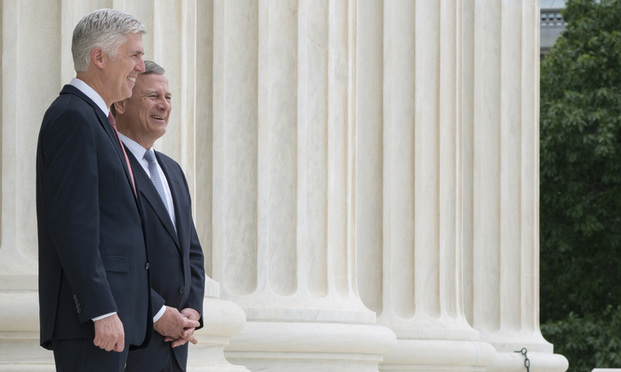 Justice Neil Gorsuch and Chief Justice John Roberts Jr. Credit: Diego M. Radzinschi / NLJ
Justice Neil Gorsuch and Chief Justice John Roberts Jr. Credit: Diego M. Radzinschi / NLJ
An “ungodly broad” obstruction provision in the federal tax code seemed likely to push the U.S. Supreme Court once again to rein in a prosecution tool.
During arguments Wednesday in Marinello v. United States, each of the nine justices—except for Justice Clarence Thomas, who did not ask a question—raised concerns about the sweep of a tax code provision that makes it a felony for anyone to corruptly obstruct or impede, or try to obstruct or impede, the “due administration” of the tax code.
“This statute, taken on its face, is just ungodly broad,” Justice Elena Kagan said at one point during the argument.
There are “many, many” regulations in the code that people are unaware of or ignore, said Justice Stephen Breyer. He and other justices asked a series of hypotheticals on whether the obstruction provision would ensnare an unwary taxpayer who doesn’t file a certain form documenting payments for gardening or snow shoveling services.
Those failures could be obstruction because it makes it harder for the IRS to assess tax liability, said Jenner & Block’s Matthew Hellman, counsel to Carlo Marinello, the freight service owner at the center of the case. Without some interpretation by the high court that limits the provision’s sweep, “it would obliterate the line between misdemeanors and felonies,” Hellman argued.
Hellman urged the justices to require as an element of the felony that a defendant had knowledge of a pending IRS proceeding. That requirement would mirror another obstruction statute enacted six years before the tax one, he said. The earlier law prohibits interference with the “due administration of justice” and the high court later interpreted it to require knowledge of a proceeding as an element.
The government’s attorney, Robert Parker, an assistant to the U.S. solicitor general, emphasized that the obstruction clause applies only when someone intends to advantage himself or herself and knows the advantage is illegal.
In the snow shoveling example, the individual knows it’s wrong not to file an IRS 1099 form and he’s a felon, Justice Neil Gorsuch asked Parker during one exchange. Parker said that, yes, this person could come within the scope of the obstruction clause. “How is a person supposed to know he is getting into trouble?” Gorsuch rejoined.
Parker insisted the mens rea—intent—requirement was “critical and exacting.” But Gorsuch said the government argued the same thing in opposing a challenge to prosecutors’ use of the honest services fraud charge and other broadly worded obstruction statutes—an argument the high court found unpersuasive in McDonnell v. United States and other cases.
The chief justice and Kagan pressed Parker about U.S. Justice Department policy for seeking the maximum offense possible. Kagan asked about the current state of DOJ guidance. “Prosecutors should be charging the most serious offense readily provable,” Parker said. Kagan asked: “If the prosecutor could proceed, she must proceed?”
Parker answered yes, but added that would not lead to tax obstruction charges becoming common and they are now only in 4 percent of cases. However, Justice Samuel Alito Jr. asked whether such prosecutorial discretion “makes the situation worse with a broad statute.”
Hellman’s client, Marinello, was indicted on nine counts of tax fraud, including failing to file individual and corporate tax returns—serious misdemeanors—and the felony of obstruction. He was convicted on all counts and sentenced to three years in prison, primarily because of the felony count.
The U.S. Court of Appeals for the Second Circuit affirmed, with two judges dissenting and writing that the majority had cleared “a garden path for prosecutorial abuse.”
Gorsuch and Sotomayor suggested another possible way to limit the obstruction provision would be to interpret it to require the individual’s obstructive act to be in some interaction with the IRS, although no audit or proceeding is underway.
After the arguments, Sidley Austin’s Jeffrey Green said: “The assistant to the solicitor general ably withstood withering questioning from the bench, but his appeal to the DOJ’s charging discretion was undone by the DOJ’s new policy requiring that the most severe charge be made in all cases. ’A win is a win is a win,’ as Justice Sotomayor phrased it, looks likely for Mr. Marinello.”
The transcript is posted below:



